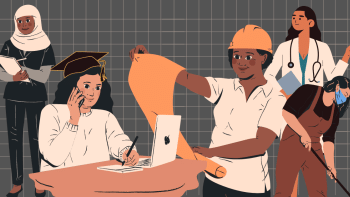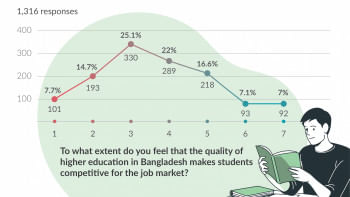Time for higher education in Bangladesh to evolve

Four years have passed since I moved to Bangladesh from the UK to serve as a registrar, first at Asian University for Women and then at Brac University. I loved Bangladesh from the moment of touchdown in Chattogram: a country and region of transcendent beauty, resourcefulness and sense of the vibration of life.
Coming from the UK, it is natural to make comparisons between the Bangladesh and UK higher education systems. There is much to learn on both sides. One of the obvious comparisons is that it generally takes far less time for full-time students to graduate in the UK than Bangladesh – three years in most cases, although there are variations. Higher education in the UK, and more widely, in Europe has, of course, had much longer to become established, with a remarkably strong research base, well-developed links with industry, and good practice in effective, dynamic approaches to teaching, learning, and student support.
Bangladesh has an opportunity, however, to avoid some of the mistakes that have occurred recently in UK higher education policy. There is presently a reductionist tendency in public policy in the UK, more particularly in England, to judge the value of higher education on the basis of short-term career outcomes and starting salaries for graduates.
We want to work in partnership with our students, not to see them primarily as customers, but to encourage their appreciation of the value of higher education. That involves challenge, self-discipline and personal transformation. Students are invited to become good, thoughtful, socially responsible citizens committed to a life of sustained service to humanity. We must help students to learn, encouraging active rather than passive learning, critical thinking, hard and soft skills, resourcefulness, entrepreneurship, and avoiding overemphasis on examinations, which stifles learning.
Bangladesh faces a curious challenge. There are high rates of graduate unemployment alongside evidence of the need for high-level graduate skills to meet the demands of a massive social and technological revolution. Many countries have invested heavily in higher education as their economies move from low wage manufacturing into diverse economies based on knowledge and high-level skills.
There are often criticisms of higher education institutions: questions whether too many people enter university and whether they are studying the right subjects. There are debates about the actual impact of higher education on student learning. The extent of university investment in vocational education is considerable, however, and often underestimated by commentators. The contribution of higher education to the economy around the world is well-evidenced, coming from research, knowledge exchange, professional training, workforce development, innovation, and creativity.
Each year, concerns are expressed through the national media about the relatively poor performance of Bangladeshi universities in world league tables. Really, Bangladesh just has not played the league table "game"; with a few exceptions, universities have not systematically focused on the criteria that inform the league table results. League tables are a marketing device that give a distorted impression, and the comparisons between institutions are highly questionable. Yet league tables can also be a powerful stimulus for institutional improvement and visibility.

There is an urgent need for substantial, nationwide improvement in higher education in Bangladesh. Some universities are engaged in significant development and there are various national initiatives, but the clock is ticking as international competition grows stronger and talented Bangladeshi graduates are disadvantaged against their contemporaries in other countries.
Prof Vincent Chang, vice-chancellor of Brac University, has observed, "Of particular concern is Bangladesh's failure to establish any globally ranked universities at the time when the country is trying to become a diversified knowledge-based economy. Higher education institutions are generally regarded as the enabling vehicles for the creation of knowledge-based industries because they ensure that future knowledge workers have the skills and competences to become globally competitive. The reason for this failure is largely down to a lack of investment in the higher education system. In the last half a century, East Asian economies have transitioned from low wage manufacturing economies into diversified knowledge-based economies. To achieve this, they have invested heavily in their higher education institutions and unashamedly imported international expertise and best practice methods…"
Facing the profound social and technological change of a new industrial revolution, Bangladesh can reap considerable benefits through reform of higher education. There are various ingredients that are necessary to a thriving higher education sector. Many of those ingredients are included already in the national Bangladesh Strategic Plan for Higher Education 2018-2030.
It can take years to develop new programmes of study even when they address urgent national, social, and economic needs. Meanwhile, some other countries race ahead without those constraints. There is an imperative for Bangladesh to introduce a more effective and timely approach to academic programme development before the country loses irreparably to international competitors.
It does not have to be that way. The national quality assurance system should focus mainly on outputs rather than inputs. Some years ago, the UK Quality Assurance Agency created an institutional review which involves a periodic assessment of quality and standards in each institution, conducted through a physical visit by teams of trained peer reviewers. Within an outcome-based system of national accreditation in Bangladesh, institutions with demonstrably robust systems could be given greater freedom to pursue programme development and educational innovation.
There appears to be a counterproductive tendency to see the public and private universities in a position of opposition to each other. There are persistent challenges for private universities to introduce new programmes, to try innovative approaches to teaching and learning and to bring industry into the classroom. We are in the strange situation where some private university faculties are able to supervise doctoral students in leading international universities, but not in their home country. The restriction on leading private universities awarding PhDs in subject areas where they have demonstrable and sustainable expertise is also a restriction on the growth of research for national benefit, of high quality postgraduate provision, and an increase in the numbers of highly qualified faculty across Bangladesh.
There is much talk in higher education circles of the value of "internationalisation." "Internationalisation" is about the higher education sector valuing diversity and functioning in an intimately connected, borderless world, where ideas and knowledge are shared. The theme of internationalisation is in the tradition of Rabindranath Tagore, who supported a concept of global community and who called for "unity in diversity," expressed in the ideas for his own schools and Visva-Bharati University.
The development of international academic partnerships should be evaluated carefully as Bangladesh becomes more attractive to international providers. Bangladesh may lose through partnerships which just lead students away to study in other countries, maybe never to return, or which damage good local providers through unfair competition. There is a need for genuine, two-way international partnership, mutual learning and capacity-building for Bangladesh. Indeed, other countries and their higher education sectors have much to learn from Bangladesh, which has profound expertise from the experience of nation-building and social and economic development over half a century.
Dr Dave Dowland is registrar of Brac University and former registrar and chief operating officer of Asian University for Women.

 For all latest news, follow The Daily Star's Google News channel.
For all latest news, follow The Daily Star's Google News channel. 









Comments